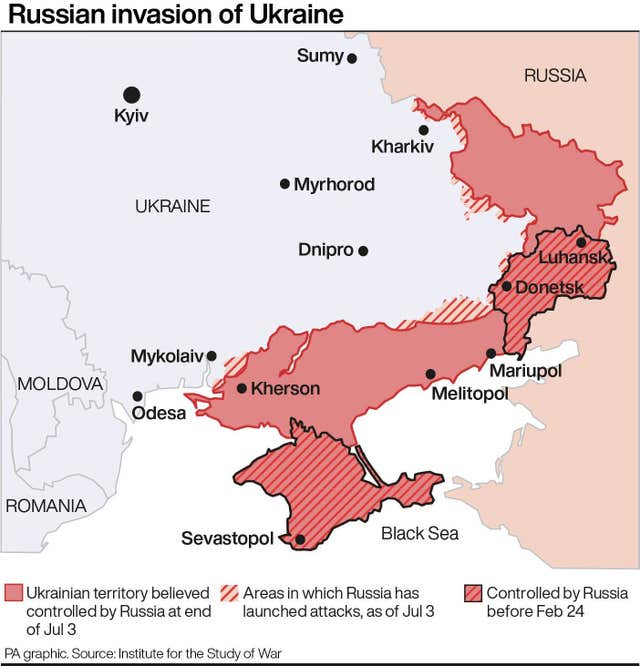EU foreign ministers focus on tightening Russia sanctions
A ban on Russian gold – Moscow’s second-largest export after energy – is being considered.

European Union foreign ministers are focused on tightening sanctions on Russia and looking at ways to add a ban on gold exports in the hope that the measures will have a decisive impact on the war in Ukraine.
The EU ministers also made a commitment to add another 500 million euros (£424 million) in military aid to Ukraine’s war chest to beef up the defence of the nation.
The decision came after a video debriefing on the latest developments through a video conference by Ukrainian foreign minister Dmytro Kuleba, who said he was “grateful” for the new funds, which brings the EU total to 2.5 billion euros (£2.1 billion) but still urged the 27 nations to provide more.

“And anybody who can do that, obviously, this is the main industrial countries of the western world. They have to step up with that.”
On restrictive measures, EU foreign affairs chief Josep Borrell said that at the moment “the most important thing is a ban on Russian gold”, which is Moscow’s second-largest export industry after energy.
The G7 group of leading industrial nations have already committed to a gold ban last month, arguing that Russia has used its gold to back up its currency to circumvent the impact of several rounds of sanctions that nations around the world had already imposed on Moscow after its February 24 invasion of Ukraine.
In Brussels, the 27 ministers will also assess how they can tighten controls on exports of high technology to Russia for a possible decision later in the week.

Internal investigations and checks would be launched following the replacement of the head of Ukraine’s security service, or SBU, Ivan Bakanov, and Prosecutor General Iryna Venediktova, Andriy Smirnov, deputy head of Ukraine’s presidential office, said.
Acting heads of the two agencies had been appointed in the meantime, officials added.
“Six months into the war, we continue to uncover loads of these people in each of these agencies,” Mr Smirnov said.
Analysts said the move was designed to strengthen Mr Zelensky’s control over the army and the security agencies that have been led by people appointed before the war.
“In the conditions of a war, Zelensky needs leaders that are capable of tackling several tasks at the same time – to resist Russia’s intrigues within the country to create a fifth column, to be in contact and co-ordination with international experts, to do their actual job effectively,” he added.
Mr Bakanov and Ms Venediktova have both held key positions amid Ukraine’s efforts to defend itself from the Russian invasion and hold the Russian attackers accountable for the crimes against civilians during the war, which started on February 24.
After appointing the acting chief prosecutor on Sunday, Mr Zelensky signed a decree on Monday naming first deputy head of the SBU, Vasyl Maliuk, as the acting head of the agency.
Mr Maluik, 39, is known for his efforts to fight corruption in the security agencies and his appointment is seen as part of Mr Zelensky’s efforts to get rid of pro-Russian staffers within the SBU.

Mr Fesenko added that discontent with the two officials had been brewing for a while and that it was possible that Ukraine’s western partners had pointed out the underperformance of the SBU and the prosecutor general’s office to Mr Zelensky.
Meanwhile, Russia pressed forward with its attacks, which Ukrainian officials said were designed to intimidate the civilian population and sow panic among them.
Ukraine’s presidential office said on Monday that Russian shelling over the past day had killed at least four civilians and wounded 13 more.
Cities and villages in seven Ukrainian regions had suffered from the attacks, the update said.





